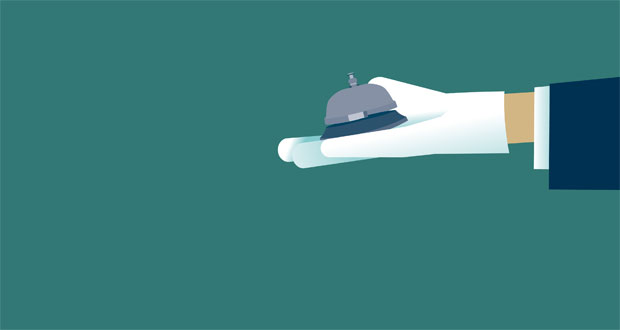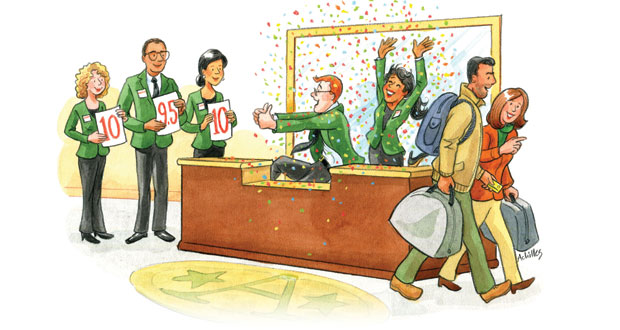
The front desk experience can make or break a guest’s hotel stay. When the process is done right, the guest is delighted, either from a fantastic interaction with a friendly associate or a quick and easy transaction that gets them up to their rooms to relax as quickly as possible. However, if the front desk does not live up to guests’ expectations, it may lead to disaster. Whether it be disorganization, unprofessional or unhelpful associates, or an overall lack of polish, a poorly run front desk leaves guests frazzled, upset, and unlikely to return to your property.
Having a stellar front desk team in place is integral to providing a fantastic experience for guests. This team needs to be smart, friendly, and able to think on their feet, anticipating needs without being asked, providing thoughtful service, and offering unique amenities and rewards that guests won’t find at competing hotels. According to some of top service providers in the industry, the best way to improve front desk functions is by empowering the employees who serve on the front line when it comes to guest satisfaction. It is imperative that hotels give these team members the tools and training programs they need to boost the all-important guest experience and generate more customers.
Scott Koster is a regional vice president for Two Roads Hospitality and general manager of Gild Hall, a Thompson Hotel. Koster oversees nine properties in the Two Roads portfolio, including Joie de Vivre’s 50 Bowery Hotel, Smyth Tribeca, The Talbot Hotel in Chicago, and the upcoming Joie de Vivre hotel in Baltimore. He says that creating a welcoming atmosphere when guests walk through the door is crucial in making a guest’s stay pleasant and memorable, and that staff should be prepared to answer questions and assist guests in any way possible. “We see our front desk as an extension of the concierge, so we want to make sure our guests get insider information about local restaurants, retail, and sightseeing,” he explains.
Front desk employees should be very focused on creating these personal connections with guests in a limited amount of time. Ashley Gochnauer, general manager of the recently opened Kimpton Everly, has trained front desk associates at her Los Angeles area property to ask questions and really listen to the responses, gathering information that leads to a thorough understanding of guests’ needs. To accomplish this, Gochaneur’s front desk associates must be confident and prepared for anything a guest throws at them.
Gochnauer says, “We are supremely focused on employee empowerment, and this can be hard to train, especially for employees who have worked in environments where they had very specific parameters of what they were able to do for the guest. We spend a lot of time deprogramming our employees from that thought process and really explain that we want them to act upon the clues they are receiving.”
This empowerment begins at training, during which staff members learn new work habits and the hotel’s policies. New employees first need to understand the property’s procedures and operations; to best accomplish this, Koster recommends first training employees in the back of house, away from guests. “To build the foundation without the pressure that comes from interacting with guests gives them confidence when the time comes to put the training into action,” Koster says. This back-of-house training typically includes the systems training, so the employee becomes familiar with the property’s booking software and property management systems, as well as background knowledge on the hotel’s operations and policies. “Once this training is complete, the new associate can stand confidently in front of the guest.”
Gochnauer adds that putting an employee on the floor too soon can both damage front desk operations and the employee’s confidence. “It’s really important for an office manager, supervisor, or whoever is owning this new employee to be attached to them until they’re sufficiently ready to be on their own.”

Front desk staff also need to understand where they fit into the bigger picture. Other departments work hand-in-hand with the front desk to keep operations moving smoothly. Not only does familiarizing departments with each other ensure quick responses to guests’ needs, it also helps employees form successful professional relationships.
Post-training, general managers can lead by example by being present on the floor. This also gives them a vantage point for quickly discovering areas for improvement because they are working directly with front-of-house employees and asking for feedback. Koster advises general managers, “Spend time at the desk and in the lobby. Observe the team and listen to the guests. If your team is not being raved about in your online reviews, then everybody can probably do a little bit more.”
Interacting, talking to, and being with the team allows a general manager to see first-hand how the front desk is performing. This also empowers the employees and shows them that everyone on the team is there for assistance when needed. Gochnauer says, “The general manager should be a hands-on leader who doesn’t just walk through the lobby but stands on the other side of the desk with the employees and seeks to understand the issues that they’re dealing with and taking quick action to resolve those issues; the goal is fixing anything that is impeding great guest service.”
Koster believes that general managers should meet with new hires at least twice post hiring, first after the first 30 days, and then again after 90 days to gather information and debug any issues that may be hindering their job performance. This way, general managers are not only focusing on front desk operations, but they are also discovering issues the front desk team as a whole may have professionally.
Although their job is often very difficult, front desk staff are an integral part of the hotel’s success. Guests may not use room service, eat in the restaurant, or see the housekeeping staff, but they need to interact with the front desk upon check-in and check-out.
Gochnauer says, “They have a hugely important position in the hotel, and if they don’t bring their A-game, they will absolutely see the negative effect of that in our guest reviews and guest surveys.”











